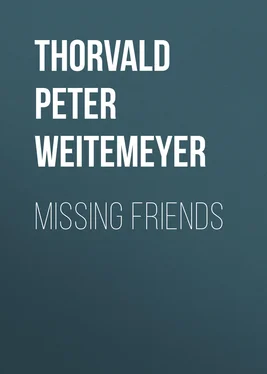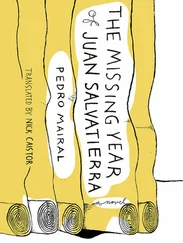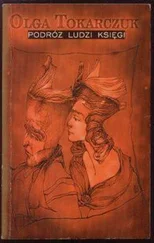Thorvald Peter Ludwig Weitemeyer - Missing Friends
Здесь есть возможность читать онлайн «Thorvald Peter Ludwig Weitemeyer - Missing Friends» — ознакомительный отрывок электронной книги совершенно бесплатно, а после прочтения отрывка купить полную версию. В некоторых случаях можно слушать аудио, скачать через торрент в формате fb2 и присутствует краткое содержание. Жанр: Путешествия и география, foreign_antique, foreign_prose, на английском языке. Описание произведения, (предисловие) а так же отзывы посетителей доступны на портале библиотеки ЛибКат.
- Название:Missing Friends
- Автор:
- Жанр:
- Год:неизвестен
- ISBN:нет данных
- Рейтинг книги:3 / 5. Голосов: 1
-
Избранное:Добавить в избранное
- Отзывы:
-
Ваша оценка:
- 60
- 1
- 2
- 3
- 4
- 5
Missing Friends: краткое содержание, описание и аннотация
Предлагаем к чтению аннотацию, описание, краткое содержание или предисловие (зависит от того, что написал сам автор книги «Missing Friends»). Если вы не нашли необходимую информацию о книге — напишите в комментариях, мы постараемся отыскать её.
Missing Friends — читать онлайн ознакомительный отрывок
Ниже представлен текст книги, разбитый по страницам. Система сохранения места последней прочитанной страницы, позволяет с удобством читать онлайн бесплатно книгу «Missing Friends», без необходимости каждый раз заново искать на чём Вы остановились. Поставьте закладку, и сможете в любой момент перейти на страницу, на которой закончили чтение.
Интервал:
Закладка:
We marched up to the main street, and I saw at once a hotel, that pointed out to me from the ship as the place in which to sell my bottles. In the bar were two or three gentlemen, of whom I took no notice. Behind the bar stood the barmaid, whom I profoundly saluted, also in Copenhagen fashion. I had what to say on the tip of my tongue, and indeed I have never forgotten it since. So I spoke to the barmaid thus: "I have bottles I will sell to you. Will you buy? Three shillings every one." She looked bewildered, not at me but at the gentlemen in the bar, as if she appealed to them for assistance, and they began to talk to me, but I did not understand them at all. I could feel myself getting red in the face, too, but I manfully made another effort. I called in the blacks and ordered them to deposit their load inside the door. Then I said with great exactness, "I—do—not—ferstan—thee—thou—ferstan—me. I—sell—this—clear—bottles—to thee—for three shillings every one. This—dead—mariner—I—sell—three—shillings—and sixpence every one. Will thou buy?" Meanwhile I had taken out of the bags two samples, a clear and a dark bottle, and placed them on the counter, and I now looked inquiringly around me.
Oh, the mortification which became my portion! The girl seemed to faint behind the bar, and the gentlemen made not the slightest excuse for laughing right out in my face. What they said I do not know, but it was clear they did not want my bottles. I felt insulted, and I determined to pay the blacks off and to leave the bottles here until I could find a German Queenslander to whom I might explain my business, and who might help me to sell them. So I took the clear bottle which stood on the counter, and handed it to the black as payment for his service. He looked viciously at me and said, "That fellow no good bottle."
I said, "Very dear bottle that." Then I decided to satisfy him at any cost, and gave him the other one, too, and said, "Very dear bottle this, dead mariner."
Now began a scene as good as a play. The blacks appealed to the gentlemen, and the gentlemen howled with laughter, and I wished myself a thousand miles away. What did they laugh at? Why did these scampish blacks not feel satisfied after having received double payment? What did it all mean? More people came in and seemed amused and happy, but I was not in the swim. Something was wrong. But what was it? I began to suspect that my bottles could not be so very valuable, as the blacks had thrown both the bottles out into the gutter. Anyhow, for me to stand here to be made a fool of would not do, so I went out of the bar and down the street. But to get away was no easy matter. In fact I found it impossible. The coloured gentleman with his three ladies were in front of me, behind me, and on both sides, crying, howling, yelling, cursing, and appealing to every one who passed, or to those who came to their doors, "That fellow big rogue. That fellow no b– good. He b– new chum. He say he give me bottle, he give me no good b– bottle; dead mariner no b– good." This was more than human nature could stand. I threw my overcoat and belltopper into the gutter, and went for the black fellow straight. I got on the top of him in a minute, but the battle was not nearly won by that, because the black ladies were tearing at my coat-tails, which just formed two fine handles for them. They split my coat right up to the shoulders, pulled my hair, and belaboured me in a general way. Now came a policeman and grabbed me by the neck. All the "ladies" ran for their lives out of sight, but I suspect their spouse was too bruised to follow their example. Anyhow, he stuck to his guns yet, and while the policeman tried to march us both down the street, he kept appealing to him, declaring his innocence, and my villainy. That I should have spent the next few days in the watch-house I am sure enough, had not an elderly man stepped out of the crowd of onlookers and spoken to the policeman. Then he addressed me in German. I learned then, through much merriment on his part and heartburning on my own, that empty bottles are in Queensland just so much rubbish. Indeed, after the policeman let me go, he took me round to the backyard of the hotel, and there I saw bottles lying by the thousands, some broken and others sound, ready to cart away. But how was I to have known that? Was it easy to guess that a bottle, which might pass for twopence English money in Copenhagen nearly as readily as cash, would here in Queensland have absolutely no value? It is like all other things one knows, easily explained: here there being no distilleries or breweries for making liquors of any kind, they are all imported, hence empty bottles become a drug in the market.
But I was not out of trouble yet. The German who had in so timely a manner come to my rescue, seeing the state of mind I was in, tried to console me by offering me a glass of spirits. I accepted his offer very readily, I admit, and coming into the bar again, which so vividly reminded me of my former shame and all the indignities heaped upon me, I poured out a whole tumblerful of raw brandy—which I should not have done, considering that I came from a ship on which nothing of that sort was served out. But I will draw a veil over the rest of this miserable day. Not but that the worst is told. Intemperance was never my weakness, but I will leave the reader to fill out the picture, and to think of me as I returned to the ship, bleeding, torn, and battered, and there I had to face poor Thorkill, who, in his mild surprise and disapproval, was to me more terrible than if he had stormed and raged ever so much.
CHAPTER IV.
GAINING COLONIAL EXPERIENCE
Having returned to the ship after the incidents related in the last chapter, and having somewhat soothed my agitated feelings, and changed my apparel, Thorkill and I were under the necessity again of returning on shore; which we did, and had no difficulty in finding the depôt or place prepared for the reception of the immigrants. I had yet scarcely noticed anything on land, but we saw now at a glance that the town was very small, or perhaps it would be more correct to say that the town was large but thinly inhabited. In Queensland we generally estimate the size of a place by the number of public-houses which it contains, and in Bowen there were three of these institutions. Grass was growing luxuriantly enough in the main street, and altogether it did not, as we came along, strike us that people here seemed remarkably busy. But when we came down to the depôt, the scene was changed.
The depôt was a large building, or series of buildings, without particularly good accommodation, but it had the advantage that there was plenty of room for everybody. I felt quite glad to again see the familiar faces of the other immigrants, although we had only been separated a few hours. There was a large kitchen attached to the place, and a vast quantity of bread and beef and potatoes had been left there, more than could possibly be eaten by those present. Two or three butchers among the immigrants, too, were quite in their element here, cutting up the bullocks, and all the girls seemed to have formed themselves into a committee in order to dress the meat in various appetizing ways. But what seemed the most encouraging feature of all was to see thirty or forty saddle-horses "hung up" outside the fence and their owners walking about among the men offering them engagements. The girls were also in great request. A number of English ladies stood about the yard, or went in and out of the kitchen. They all seemed to want the girls who were doing the cooking, and what between the English ladies who kept trying to attract their attention, their own sweethearts—who had now the first opportunity since they left Hamburg to speak to them—and the preparation of food for six hundred and odd people, they certainly had enough to do. It was comical to watch them. Among the men the scene was but one degree less animated. They might, I am sure, all have been engaged that first day if they had liked. A number were engaged, and over and over again were offers made to them of further engagements, until at last they turned their backs to the Englishmen who seemed almost to implore some of them to sign agreements. They were all offered the same terms—thirty pounds for twelve months, and rations. The girls got only twenty or twenty-five pounds a year, but there seemed to be very little difference between the agreements. The Queenslanders would go for the biggest and most able looking of the men first, and when they had secured them, engage the others with the same terms. I saw my "boss" down there, and went home with him for supper. I was received with the greatest kindness by his family, and he himself could not have looked more friendly if I had been a long-lost relation. He proved to be a contractor, and had also a carpenter's shop and showroom attached to his place. He took me into the shop and showed me several things, and asked me could I make this or that? There was nothing in the shop that a boy who had served two years of his life in Copenhagen could not make, but when I said "yes," he seemed greatly pleased with me, and patted me on the back. We could not understand each other very much. After tea, I was shown into a neat room, where stood a nice bed, a chest of drawers, table, chair, &c. This was to be my abode.
Читать дальшеИнтервал:
Закладка:
Похожие книги на «Missing Friends»
Представляем Вашему вниманию похожие книги на «Missing Friends» списком для выбора. Мы отобрали схожую по названию и смыслу литературу в надежде предоставить читателям больше вариантов отыскать новые, интересные, ещё непрочитанные произведения.
Обсуждение, отзывы о книге «Missing Friends» и просто собственные мнения читателей. Оставьте ваши комментарии, напишите, что Вы думаете о произведении, его смысле или главных героях. Укажите что конкретно понравилось, а что нет, и почему Вы так считаете.












